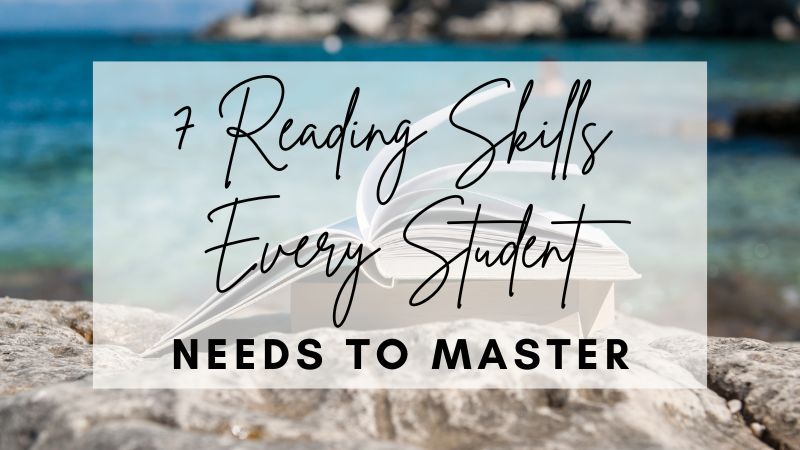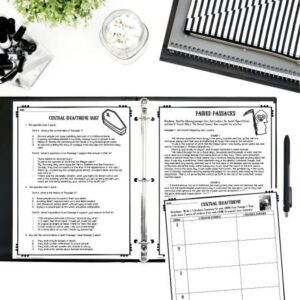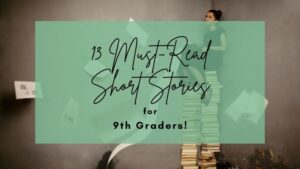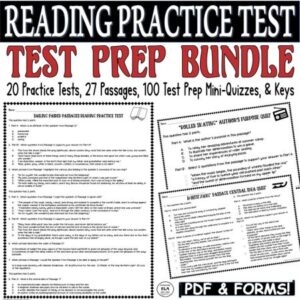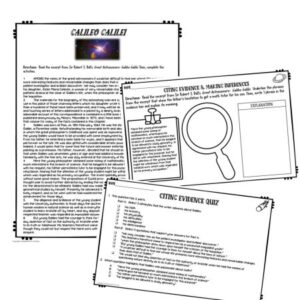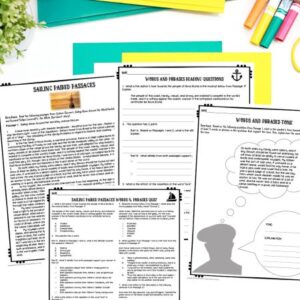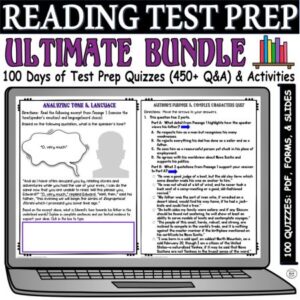Teaching reading skills is quite a challenge in today’s age. I know when I want to learn a new skill, strategy, concept, or idea, I often get frustrated because I have little patience. I feel I should be able to master something in ten minutes or less, and I’ll admit that mindset is completely ridiculous.
Plus, most things, like reading skills, are learned over time, lots and lots of time.
There is no magic trick, hack, professional development, or foolproof program that can guarantee students’ reading skills will grow in any substantial or meaningful way. Helping students increase their reading comprehension abilities takes time, intentionally, and practice.
Keep reading for 7 Reading Skills EVERY Student Needs to Master!
Want help with Reading Skills and Test Prep? Check out this FREE Pack of 3 Test Prep Activities to help students achieve success on standardized tests while reading classic lit!
7 Reading Skills EVERY Student Needs to Master
1. Rereading Consistently
No matter how often I have to shout this from the rooftop for all to hear, I will! We must teach, model, practice, and reinforce the skill of rereading!
Simply put, rereading is utterly underrated in the world of reading comprehension. When I think of how I have taught my own children to read, I am amazed by what they have taught me about the reading process.
And guess what? Rereading is the penultimate of all reading skills! I reread pretty much every day: political texts, emails, articles, nonfiction books, literature, or blog posts!
Consider how kids are first exposed to the written word and how they learn to read in the first place:
- They go to the library, pick out the same books over and over again, read, and then reread those books some more.
- They read a variety of books from classics to fables to adventures and beyond…and reread the books again throughout the week.
- They learn letters, sounds, phonics, sight words, etc. over and over again, which they need.
- They reread directions for school: math worksheets, science lessons, and stories from history.
They are rereading EVERYTHING all the time.
So…ONCE is NEVER enough to make gains in reading skills!
My 7-year-old, who reads on a 5th-6th grade level, and my almost 5-year-old, who is beginning to read short books, reread ALL the time.
And I model how to reread whenever I can. There is no shame in having to reread something, which many struggling readers don’t realize.
Sometimes, my mind wanders. Sometimes, I am tired. Sometimes, I have lots of other things to think of. Sometimes, I read and immediately forget what I have read. Sometimes, I am confused by what I have read. Sometimes, I just don’t care.
Well, that’s why we reread. You won’t understand everything the first time, and GOOD READERS REREAD!
Need short stories for 9th graders to help develop their reading skills? Click below!
2. Making Connections
I like to think of the reading process as a spider spinning its web. All knowledge and skills represent strands that are connected in some way whether by topic, vocabulary, personal relateability, context, time period, syntax, etc.
Everything comes together to form someone’s reading web!
And kids, like spiders, come with different webs because we are all living individual, unique lives!
As teachers, we need to meet students where they are to MAKE CONNECTIONS based on what they know and help fill in the gaps when they don’t know. When something new is learned, we add a strand to the web.
Click here for practice tests with a reading skills focus!
Here are ways to help your students develop their reading skills through making connections:
- Preview a text by providing background information.
- Analyze and break down vocabulary ahead of time.
- Choose texts that are related in some way: thematically, historically, or structurally.
- Read texts students have already read: fairy tales, myths, legends, short stories, poems, etc.
- Pair higher-level texts with more “engaging” texts.
- Before, during, or after reading watch clips that might link to the text in some way.
- Reteach major concepts and reading strategies every week.
When we teach the art of making connections, we are guiding students along their journeys of being lifetime readers!
3. Responding to Reading
Reading comprehension and critical thinking increase when people interact with what they read. Requiring students to respond instead of merely sitting, listening, and moving on is key!
There are so many ways to respond to what you are reading:
- Ask Questions About It: Ex. Why did the author include this part? Ex. How does this text connect to what I have read before? Ex. What did I learn from this chapter?
- Write About It: Ex. Write a letter from a character’s point of view. Ex. Draft a poem about the topic from an opposing perspective. Ex. Create an advertisement to promote the text.
- Talk About It: Ex. Participate in a Socratic seminar on major themes. Ex. Think, Pair, and Share your knowledge with a partner. Ex. Present a skit version of the text to the class.
- Annotate About It: Ex. Highlight important words, phrases, and sentences. Ex. Take notes on certain topics. Ex. Use specific symbols for various ideas.
- Draw About It: Ex. Illustrate the major events in the text. Ex. Create a movie poster or reel based on the story. Ex. Visualize the characters and how they develop.
When we respond, we remember and we retain.
4. Reading Diverse AND High-Level Texts
Unfortunately, too many kids are reading below grade level. In my home state of Florida, only about 50% of 10th graders are reading on or above grade level, according to the Florida Department of Education.
After 19 years in education and many changes in curriculum over that span, I have yet to see standards increase or texts become more complex. If anything, the system regularly provides more contemporary texts in an attempt to make learning more “fun,” “engaging” or “relatable.”
Well, it’s not working; students are not exposed to classic texts that have made up our American Literature and World Literature canon for hundreds/thousands of years. While I believe in personal choice when it comes to independent reading, the purpose of the English classroom is to encourage students to read what they won’t read by themselves.
Few students nowadays are going to pick up a Shakespeare play, a Dickinson poem, a Poe short story, or a Douglass narrative. We as teachers MUST offer a range of diverse AND high-level texts to our students!
We cannot shy away from college-level texts in high school classes because they are too HARD for our students. How are students supposed to prepare for college if they have never read complex texts? How are students going to know what they need to know about history, science, politics, and literature if they are not engaging with difficult and long texts?
This doesn’t mean you have to teach fifteen novels every year; however, in high school, there should be at least major novels/plays as a part of our personal canons. If you can fit more in, that is fantastic!
Don’t forget; you don’t have to read it all yourself. Audiobooks are fantastic, online versions are wonderful, and some silent reading moments never hurt anyone.
5. Challenging Yourself
There are so many aspects of reading that I find enjoyable, mostly because I am good at it. Think about it; we usually like to do whatever we do well. Makes sense.
Because reading does not necessarily come naturally for most students, reading ANY text in the beginning stages of reading may be challenging. However, our ultimate goal is to develop readers throughout their school years, so they will become adults who read whether for college, a trade, continuing education, personal enjoyment, learning a skill, participating in politics, etc.
We must constantly challenge ourselves to develop more sophisticated reading skills. There are many ways to do this!

10 WAYS TO CHALLENGE YOURSELF TO REFINE YOUR READING SKILLS:
- Read consistently.
- Read for sustained periods.
- Read texts from unexpected places.
- Read something different from your usual repertoire.
- Read books with opposing viewpoints.
- Read foundational classics you may have avoided over the years.
- Read to learn a topic that is completely foreign to you.
- Read as a part of a book club.
- Read to or with someone else.
There is no way to fully master reading because the world of reading is infinite! There are so many ideas, authors, genres, and styles to explore, and when I have to struggle through a text, I tend to grow the most in my reading skills.
Few people choose to read Shakespeare for fun, but when you do, you often will share that you did with others. Remember, however, that you are on your own marathon. You get to grow at whatever pace you desire because only you can choose to sit and simply read.
6. Developing Vocabulary
Even though I have taught English for over 19 years, I am by no means a dictionary. I am constantly learning new words, especially words related to history, science, and politics.
You would think with a master’s degree I would have accumulated some sort of “mastery” of the English language, but I hope I am humble enough to say that the more I read, the more I realize I don’t know as much as I think.
One thing I have done to develop my reading skills over the last forty years is to stop reading when I encounter a word or idea I am unfamiliar with.
For example, my daughters and I have been reading about ancient civilizations as a part of their history class. I came across the word “fasces” while reading with them yesterday. Instead of trudging on, we stopped and did a little research into the word and its uses historically as well as today!
I learned so much, and so did my kids. The more I learn, the more I can share with them and my students!
7. Reading Daily
Like anything, reading skills must be honed daily. We cannot think that a kid who reads once or twice a week will be on the same reading level as someone who reads daily.
Statistically speaking, a kid who chooses to read for 30 minutes a day will be more successful at reading than those who don’t. There is no strategy you can teach a kid to replace the simple act of reading consistently over time.
The kid who devotes afternoons to shooting free throws for many hours a day over many years will become a MUCH better shooter.
The kid who runs every day will be able to run longer and better than the kid who purposefully avoids running.
The kid who learns and cooks a different recipe several times a week will become more competent than the kid whose parent does all the cooking.
All of this makes sense! No technique we can teach will top the repetitive, purposeful act of reading over many weeks, years, and decades. If you want your own children or your students to become better readers, we need to read to them and with them MORE not less.
For years, I have seen classrooms cut longer novels or plays in favor of teaching excerpts or watching film versions. While I also will include these throughout the year, we MUST read ALL of the time. Five worksheets for one short story will not help our students cultivate their reading skills in any significant way.
Reading 20 stories will almost always help our kids advance their reading skills more than reading only 1 or 2. Consider that many schools have not increased the reading expectations of their students but have actually decreased them over the last fifty years. Has it helped? Nope!
Taking two weeks to analyze a single short story is not effective. Watching the film version of Romeo and Juliet cannot replace the actual reading of Shakespeare. You might not be able to get through the entire play; however, you can read a lot of it!
Reading every day for a sustained period with a focus on vocabulary and higher-level texts will help the most in developing children’s reading skills!
RESOURCES TO HELP PRACTICE READING SKILLS
Do you need help with reading test prep this year? This Distance Learning for use in Google Classroom(TM) Reading Comprehension Test Prep Lesson and Quiz ULTIMATE BUNDLE prepares middle and high school students for state exams and assessments by incorporating informational texts, literary texts, and paired passages!
It includes 100 EASY-TO-TEACH lessons with DIGITAL worksheets, activities, writing responses, passages, and Common Core Style Test Prep QUESTIONS and ANSWERS in PDF format as well as Google Classroom Slides!
Just PRINT/ASSIGN and TEACH test prep and reading skills!!
Do you need more fun lessons and activities to help your students develop their reading skills? Check out my store Kristin Menke-Integrated ELA Test Prep!

